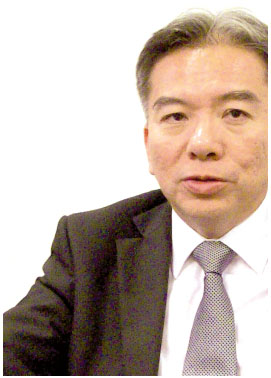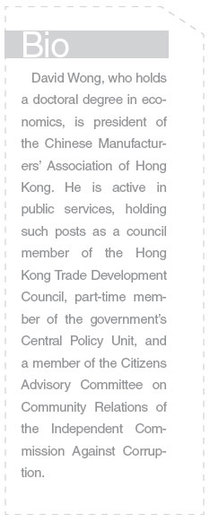Hong Kong economy needs diversity
Updated: 2011-06-10 08:03
By Joseph Li(HK Edition)
|
|||||||

The local economy is doing well yet there remain hidden problems, says President of the Chinese Manufacturers' Association of Hong Kong David Wong. He adds, in an interview with China Daily's Joseph Li, that the most important task facing the 2012 chief executive will be housing and the livelihoods of Hong Kong's people.
Hong Kong's short-term economic prospect appears healthy. GDP growth is robust. The jobless rate has dropped and the city is close to full employment. Clearly Hong Kong has recovered from the 2008 financial crisis, David Wong told China Daily in an exclusive interview.
"There are hidden problems lying ahead of us, with inflation, which is a global issue, being the biggest," he points out.
"The reason why Hong Kong's economy is doing quite well at this time is because the US and Euro-zone economies have not fully recovered from the trauma of the financial crisis. We have seen consequences such as the Quantitative Easing I and II and ultra-low interest rates.
"The historic low interest rate (i.e. negative interest rate) is a rather unhealthy thing that creates asset bubbles, while the relaxed currency policy has resulted in a huge influx of 'cheap credit' into Hong Kong, pushing up prices in the property and financial markets.
"Prompted by the Individual Travellers Scheme that allows mainland citizens to visit Hong Kong, retail spending is robust, but the rent for service apartments, prices and rents of retail shop spaces have soared very high, leaving the impression that Hong Kong's economy is merely propped up by three things namely: property, finance and tourism."

The uneven development of the industrial structure is Hong Kong's other hidden problem, he says.
"It not only brings up property prices but also the prices of other goods, and this is not conducive to the business environment in Hong Kong," he cautions.
Wong agrees that the resumption of the Home Ownership Scheme would increase the supply of residential units and that, he says, would be helpful because it would give hope to potential home buyers.
The sooner these issues are resolved, he observes, the better. The longer they linger, the greater they will become over the long term.
"It hinges on when the US government will begin its market exit strategy or stop quantitative easing exercises. It seems the earliest will be the fourth quarter of this year. Yet since the US economy is recovering slowly, the adjustment may not happen until next year," he predicts.
Hong Kong's industrial structure should be more varied, he says. If it is too narrow, severe unemployment will occur in the event of economic upheavals.
"The reason is, the better jobs can only be found in a few sectors or the high-end sectors, whereas the other jobs are either low-paid ones or do not carry good advancement prospects," he says. "We are very concerned with the industrial structure. If it is not well-balanced, it will affect overall economic development and people's livelihood in Hong Kong."
Wong agrees that the six premier industries, such as education and medical services, are the right way forward. The industries became targeted as a means of supporting the economy after the financial crisis. The city has the requisites to become a regional higher education and medical services hub, yet land supply has become a bottleneck that blocks further development.
"The limited supply of land affects the development of Hong Kong in many aspects," he remarks.
(HK Edition 06/10/2011 page4)